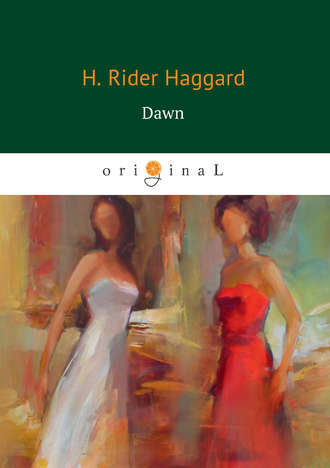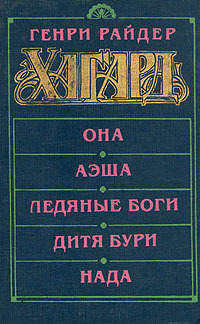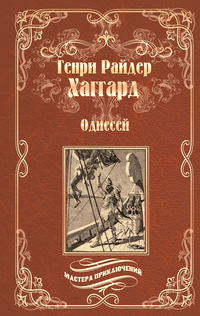
Полная версия
Dawn
"All right, Maria; I was only plucking one for you. Won’t you put it in your dress? Where are the others?”
"They have all gone. Come in, it is so hot out there; and tell me what you think of Mrs. Bellamy.”
"I think that she is very handsome and very clever. I wonder where Bellamy picked her up.”
"I don’t know; I wish he hadn’t picked her up at all. I don’t like her, she says unpleasant things; and, though I have only seen her three times, she seems to know all about me and everybody else. I am not very quick; but do you know just now I thought that she was insinuating that you were in love with Hilda; that’s not true, is it, Philip? Don’t think me forward if I ask you if that is true, and if I say that, if it is, it is better that I should know it. I sha’n’t be angry, Philip;” and the girl stood before him to await his answer, one hand pressed against her bosom to still the beating of her heart, whilst with the other she screened her blushing brow.
And Philip too stood face to face with her sweet self, with conscience, and with opportunity. "Now,” whispered conscience, "is the time, before very much harm is done; now is the acceptable time to tell her all about it, and, whilst forbidding her love, to enlist her sympathy and friendship. It will be wrong to encourage her affection; when you ardently love another woman, you cannot palter any more.” "Now,” whispered opportunity, shouldering conscience aside, "is the time to secure her, her love, and her possessions, and to reward Hilda for her pride. Do not sacrifice yourself to an infatuation; do not tell her about Hilda—it would only breed jealousies; you can settle with her afterwards. Take the goods the gods provide you.”
All this and more passed through his mind; and he had made his choice long before the rich blood that mantled in the lady’s cheek had sunk back to the true breast from whence it came.
Oh, instant of time born to colour all eternity to thine own hue, for this man thou hast come and gone! Oh, fleeting moment, bearing desolation or healing on thy wings, how the angels, in whose charge lie the souls of men, must tremble and turn pale, as they mark thy flight through the circumstances of a man’s existence, and thence taking thy secrets with thee away to add thy fateful store to the records of his past!
He took her hand, the hand that was pressed upon her bosom.
"Maria,” he said, "you should not get such ideas into your head. I admire Hilda very much, and that is all. Why, dear, I have always looked upon myself as half engaged to you—that is, so far as I am concerned; and I have only been waiting till circumstances would allow me to do so, to ask you if you think me worth marrying.”
For a while she made no reply, but only blushed the more; at last she looked up a little.
"You have made me very happy, Philip.” That was all she said.
"I am very glad, dear, that you can find anything in me to like; but if you do care for me, and think me worth waiting for, I am going to ask something of your affection: I am going to ask you to trust me as well as to love me. I do not, for reasons that I will not enter into, but which I beg you to believe are perfectly straightforward, wish anything to be said of our engagement at present, not even to your friend Hilda. Do you trust me sufficiently to agree to that?”
"Philip, I trust you as much as I love you, and for years I have loved you with all my heart. And now, dear, please go; I want to think.”
In the hall a servant gave him a note; it was from Hilda, and ran thus —
"I have changed my mind. I will meet you in the summer-house this evening. I have something to say to you.”
Philip whistled as he read it.
"Devilish awkward,” he thought to himself; "if I am going to marry Maria, she must leave this. But I cannot bear to part with her. I love her! I love her!”
Chapter VI
It was some time before Philip could make up his mind whether or no he would attend his tryst with Hilda. In the first place, he felt that it was an unsafe proceeding generally, inasmuch as moonlight meetings with so lovely a person might, should they come to the knowledge of Miss Lee, be open to misconstruction; and particularly because, should she show the least tenderness towards him, he knew in his heart that he could not trust himself, however much he might be engaged in another direction. At twenty-one the affections cannot be outraged with impunity, but have an awkward way of asserting themselves, ties of honour notwithstanding.
But as a rule, when in our hearts we wish to do anything, that thing must be bad indeed if we cannot find a satisfactory excuse for doing it; and so it was with Philip. Now, thought he to himself, would be his opportunity to inform Hilda of his relations with Maria Lee, and to put an end to his flirtation with her; for, ostensibly at any rate, it was nothing more than a very serious flirtation—that is to say, though there had been words of love, and even on her part a passionate avowal of affection, wrung in an unguarded moment from the depths of her proud heart, there had been no formal engagement. It was a thing that must be done, and now was the time to do it. And so he made up his mind to go.
But when, that night, he found himself sitting in the appointed place, and waiting for the coming of the woman he was about to discard, but whom he loved with all the intensity of his fierce nature, he began to view the matter in other lights, and to feel his resolution oozing from him. Whether it was the silence of the place that told upon his nerves, strained as they were with expectation—for silence, and more especially silence by night, is a great unveiler of realities,—or the dread of bitter words, or the prescience of the sharp pang of parting—for he knew enough of Hilda to know that, what he had to say once said, she would trouble him no more— whether it was these things, or whatever it was that affected him, he grew most unaccountably anxious and depressed. Moreover, in this congenial condition of the atmosphere of his mind, all its darker and hidden characteristics sprang into a vigorous growth. Superstitions and presentiments crowded in upon him. He peopled his surroundings with the shades of intangible deeds that yet awaited doing, and grew afraid of his own thoughts. He would have fled from the spot, but he could not fly; he could only watch the flicker of the moonlight upon the peaceful pool beside him, and—wait.
At last she came with quick and anxious steps, and, though but a few minutes before he had dreaded her coming, he now welcomed it eagerly. For our feelings, of whatever sort, when directed towards each other, are so superficial as compared with the intensity of our fears when we are terrified by calamity, or the presence, real or fancied, of the unknown, that in any moment of emergency, more especially if it be of a mental kind, we are apt to welcome our worst enemy as a drowning man welcomes a spar.
"At last,” he said, with a sigh of relief. "How late you are!”
"I could not get away. There were some people to dinner;” and then, in a softened voice, "How pale you look! Are you ill?”
"No, only a little tired.”
After this there was silence, and the pair stood facing one another, each occupied with their own thoughts, and each dreading to put them into words. Once Philip made a beginning of speech, but his voice failed him; the beating of his heart seemed to choke his utterance.
At length she leaned, as though for support, against the trunk of a pine- tree, in the boughs of which the night breeze was whispering, and spoke in a cold clear voice.
"You asked me to meet you here to-night. Have you anything to say to me? No, do not speak; perhaps I had better speak first. I have something to say to you, and what I have to say may influence whatever is in your mind. Listen; you remember what passed between us nearly a month ago, when I was so weak as to let you see how much I loved you?”
Philip bowed his head in assent.
"Very good. I have come here to-night, not to give you any lover’s meeting, but to tell you that no such words must be spoken again, and that I am about to make it impossible that they should be spoken either by you or by me. I am going away from here, never, I hope, to return.”
"Going away!” he gasped. "When?”
Here was the very thing he hoped for coming to pass, and yet the words that should have been so full of comfort fell upon him cold as ice, and struck him into misery.
"When! why, to-morrow morning. A relation of mine is ill in Germany, the only one I have. I never saw him, and care nothing for him, but it will give me a pretext; and, once gone, I shall not return. I have told Maria that I must go. She cried about it, poor girl.”
At these words, all recollection of his purpose passed out of Philip’s mind; all he realized was that, unless he could alter her determination, he was about the lose the woman he so passionately adored, and whose haughty pride was to him in itself more charming than all poor Maria’s gentle love.
"Hilda, do not go,” he said, seizing her hand, which she immediately withdrew; "do not leave me. You know how I love you.”
"And why should I not leave you, even supposing it to be true that you do love me? To my cost I love you, and am I any longer to endure the daily humiliation of seeing myself, the poor German companion, who has nothing but her beauty, put aside in favour of another whom I also love. You say you love me, and bid me stay; now, tell me what is your purpose towards me? Do you intend to try to take advantage of my infatuation to make me your mistress? It is, I am told, a common thing for such proposals to be made to women in my position, whom it would be folly for wealthy gentlemen to marry. If so, abandon that idea; for I tell you, Philip, that I would rather die than so disgrace my ancient name to gratify myself. I know you money-loving English do not think very much of race unless the bearers of the name are rich; but we do; and, although you would think it a mesalliance to marry me, I, on the other hand, should not be proud of an alliance with you. Why, Philip, my ancestors were princes of royal blood when yours still herded the swine in these woods. I can show more than thirty quarterings upon my shield, each the mark of a noble house, and I will not be the first to put a bar sinister across them. Now, I have spoken plainly, indelicately perhaps, and there is only one more word to be said between us, and that word is good-bye,” and she held out her hand.
He did not seem to see it; indeed, he had scarcely heard the latter part of what she said. Presently he lifted his face, and it bore traces of a dreadful inward struggle. It was deadly pale, and great black rings had painted themselves beneath the troubled eyes.
"Hilda,” he said, hoarsely, "don’t go; I cannot bear to let you go. I will marry you.”
"Think of what you are saying, Philip, and do not be rash. I do not wish to entrap you into marriage. You love money. Remember that Maria, with all her possessions, asks nothing better than to become your wife, and that I have absolutely nothing but my name and my good looks. Look at me,” and she stepped out into a patch of moonlight that found its way between the trees, and, drawing the filmy shawl she wore from her head and bare neck and bosom, stood before him in all the brightness of her beauty, shaded as it was, and made more lovely by the shadows of the night.
"Examine me very carefully,” she went on, with bitter sarcasm, "look into my features and study my form and carriage, or you may be disappointed with your bargain, and complain that you have not got your money’s worth. Remember, too, that an accident, an illness, and at the best the passage of a few years, may quite spoil my value as a beautiful woman, and reflect, before I take you at your word.”
Philip had sat or rather crouched himself down upon the log of a tree that lay outside the summer-house, and covered his face with his hand, as though her loveliness was more than he could bear to look upon. Now, however, he raised his eyes and let them dwell upon her scornful features.
"I had rather,” he said slowly—”I had rather lose my life than lose you; I love you so that I would buy you at the price even of my honour. When will you marry me?”
"What, have you made up your mind so quickly? Are you sure? Then,” —and here she changed her whole tone and bearing, and passionately stretched out her arms towards him,—”my dearest Philip, my life, my love, I will marry you when you will.”
"To-morrow?”
"To-morrow, if you like!”
"You must promise me something first.”
"What is it?”
"That you will keep the marriage a complete secret, and bear another name until my father’s death. If you do not, he will most probably disinherit me.”
"I do not like your terms, Philip. I do not like secret marriages; but you are giving up much to marry me, so I suppose I must give up something to marry you.”
"You solemnly promise that nothing shall induce you to reveal that you are my wife until I give you permission to do so?”
"I promise—that is, provided you do not force me to in self- defence.”
Philip laughed.
"You need not fear that,” he said. "But how shall we arrange about getting married?”
"I can meet you in London.”
"Very well. I will go up early to-morrow, and get a licence, and then on Wednesday I can meet you, and we can be married.”
"As you will, Philip; where shall I meet you?”
He gave her an address which she carefully noted down.
"Now,” she said, "you must go, it is late. Yes, you may kiss me now. There, that will do, now go.” In another minute he was gone.
"I have won the game,” she mused; "poor Maria. I am sorry for her, but perhaps hers is the better part. She will get over it, but mine is a sad fate; I love passionately, madly, but I do not trust the man I love. Why should our marriage be so secret? He cannot be entangled with Maria, or she would have told me.” And she stretched out her arms towards the path by which he had left her, and cried aloud, in the native tongue that sounded so soft upon her lips, "Oh, my heart’s darling! if I could only trust you as well as I love you, it is a happy woman that I should be to-night.”
Chapter VII
Nothing occurred to interfere with the plan of action decided on by Hilda and Philip; no misadventure came to mock them, dashing the Tantalus cup of joy to earth before their eyes. On the contrary, within forty-eight hours of the conversation recorded in the last chapter, they were as completely and irrevocably man and wife, as a special licence and the curate of a city church, assisted by the clerk and the pew-opener, could make them.
Then followed a brief period of such delirium as turned the London lodgings, dingy and stuffy as they were in the height of the hot summer, into an earthly paradise, a garden of Eden, into which, alas! the serpent had no need to seek an entrance. But, as was natural, when the first glory of realized happiness was beginning to grow faint on their horizon, the young couple turned themselves to consider their position, and found in it, mutually and severally, many things that did not please them. For Philip, indeed, it was full of anxieties, for he had many complications to deal with. First there was his secret engagement to Maria Lee, of which, be it remembered, his wife was totally ignorant, and which was in itself a sufficiently awkward affair for a married man to have on his hands. Then there was the paramount need of keeping his marriage with Hilda as secret as the dead, to say nothing of the necessity of his living, for the most part, away from his wife. Indeed, his only consolation was that he had plenty of money on which to support her, inasmuch as his father had, from the date of his leaving Oxford, made him an allowance of one thousand a year.
Hilda had begun to discover that she was not without her troubles. For one thing, her husband’s fits of moodiness and fretful anxiety troubled her, and led her, possessed as she was with a more than ordinary share of womanly shrewdness, to suspect that he was hiding something from her. But what chiefly vexed her proud nature was the necessity of concealment, and all its attendant petty falsehoods and subterfuges. It was not pleasant for Hilda Caresfoot to have to pass as Mrs. Roberts, and to be careful not to show herself in public places in the daytime, where there was a possibility of her being seen by any one who might recognize in her striking figure the lady who had lived with Miss Lee in Marlshire. It was not pleasant to her to be obliged to reply to Maria Lee’s affectionate letters, full as they were of entreaty for her return, by epistles that had to be forwarded to a country town in a remote district of Germany to be posted, and which were in themselves full of lies that, however white they might have seemed under all the circumstances, she felt in her conscience to be very black indeed. In short, there was in their union none of that sense of finality and of security that is, under ordinary circumstances, the distinguishing mark of marriage in this country; it partook rather of the nature of an illicit connection.
At the end of a fortnight of wedded bliss all these little things had begun to make themselves felt, and in truth they were but the commencement of evils. For, one afternoon, Philip, for the first time since his wedding, tore himself away from his wife’s side, and paid a visit to a club to which he had been recently elected. Here he found no less than three letters from his father, the first requesting his return, the second commanding it in exceptionally polite language, and the third—which, written in mingled anxiety and anger, had just arrived—coolly announcing his parent’s intention, should he not hear of him by return, of setting detective officers to work to discover his whereabouts. From this letter it appeared, indeed, that his cousin George had already been despatched to London to look for him, and on reference to the hall porter he discovered that a gentleman answering to his description had already inquired for him several times.
Cursing his own folly in not having kept up some communication with his father, he made the best of his way back to his lodgings, to find Hilda waiting for him somewhat disconsolately.
"I am glad you have come back, love,” she said, drawing him towards her till his dark curls mingled with her own fair locks, and kissing him upon the forehead. "I have missed you dreadfully. I don’t understand how I can have lived all these years without you.”
"I am afraid, dear, you will have to live without me for a while now; listen,” and he read her the letters he had just received.
She listened attentively till he had finished.
"What are you going to do?” she asked, with some anxiety in her voice.
"Do? why of course I must go home at once.”
"And what am I to do?”
"Well, I don’t know; I suppose that you must stop here.”
"That will be pleasant for me, will it not?”
"No, dear, it will be pleasant neither for you nor me; but what can I do? You know the man my father is to deal with; if I stop here in defiance to his wishes, especially as he has been anxious about me, there is no knowing what might not happen. Remember, Hilda, that we have to deal with George, whose whole life is devoted to secret endeavours to supplant me. If I were to give him such an opportunity as I should by stopping away now, I should deserve all I got, or rather all I did not get.”
Hilda sighed and acquiesced; had she been a softer-minded woman she would have wept and relieved her feelings, but she was not soft- minded. And so, before the post went out, he wrote an affectionate letter to his father, expressing his sorrow at the latter’s anxiety at at his own negligence in not having written to him, the fact of the matter being, he said, that he had been taken up with visiting some of his Oxford friends, and had not till that afternoon been near his club to look for letters. He would, however, he added, return on the morrow, and make his apologies in person.
This letter he handed to his wife to read.
"Do you think that will do?” he asked, when she had finished.
"Oh, yes!” she replied, with a touch of her old sarcasm, "it is a masterpiece of falsehood.”
Philip looked very angry, and fumed and fretted; but he made no reply, and on the following morning he departed to Bratham Abbey.
"Ah, Philip, Philip!” said his father, under the mellow influence of his fourth glass of port, on the night of his arrival. "I know well enough what kept you up in town. Well, well, I don’t complain, young men will be young men; but don’t let these affairs interfere with the business of life. Remember Maria Lee, my boy; you have serious interests in that direction, interests that must not be trifled with, interests that I have a right to expect you will not trifle with.”
His son made no reply, but sipped his wine in silence, aching at his heart for his absent bride, and wondering what his father would say did he really know what had "kept him in town.”
After this, matters went on smoothly enough for a month or more; since, fortunately for Philip, the great Maria Lee question, a question that the more he considered it the more thorny did it appear, was for the moment shelved by the absence of that young lady on a visit to her aunt in the Isle of Wight. Twice during that month he managed, on different pretexts, to get up to London and visit his wife, whom he found as patient as was possible under the circumstances, but anything but happy. Indeed, on the second occasion, she urged on him strongly the ignominy of her position, and even begged him to make a clean breast of it to his father, offering to undertake the task herself. He refused equally warmly, and some sharp words ensued to be, however, quickly followed by a reconciliation.
On his return from this second visit, Philip found a note signed "affectionately yours, Maria Lee,” waiting for him, which announced that young lady’s return, and begged him to come over to lunch on the following day.
He went—indeed, he had no alternative but to go; and again fortune favoured him in the person of a diffident young lady who was stopping with Maria, and who never left her side all that afternoon, much to the disgust of the latter and the relief of Philip. One thing, however, he was not spared, and that was the perusal of Hilda’s last letter to her friend, written apparently from Germany, and giving a lively description of the writer’s daily life and the state of her uncle’s health, which, she said, precluded all possibility of her return. Alas! he already knew its every line too well; for, as Hilda refused to undertake the task, he had but a week before drafted it himself. But Philip was growing hardened to deception, and found it possible to read it from end to end, and speculate upon its contents with Maria without blush or hesitation.
But he could not always expect to find Miss Lee in the custody of such an obtuse friend; and, needless to say, it became a matter of very serious importance to him to know how he should treat her. It occurred to him that his safest course might be to throw himself upon her generosity and make a clean breast of it; but when it came to the point he was too weak to thus expose his shameful conduct to the woman whose heart he had won, and to whom he was bound by every tie of honour that a gentleman holds sacred.
He thought of the scornful wonder with which she would listen to his tale, and preferred to take the risk of greater disaster in the future to the certainty of present shame. In the end, he contrived to establish a species of confidential intimacy with Maria, which, whilst it somewhat mystified the poor girl, was not without its charm, inasmuch as it tended to transform the every- day Philip into a hero of romance.
But in the main Maria was ill-suited to play heroine to her wooer’s hero. Herself as open as the daylight, it was quite incomprehensible to her why their relationship should be kept such a dark and mysterious secret, or why, if her lover gave her a kiss, it should be done with as many precautions as though he were about to commit a murder.
She was a very modest maiden, and in her heart believed it a wonderful thing that Philip should have fallen in love with her—a thing to be very proud of; and she felt it hard that she should be denied the gratification of openly acknowledging her lover, and showing him off to her friends, after the fashion that is so delightful to the female mind.











